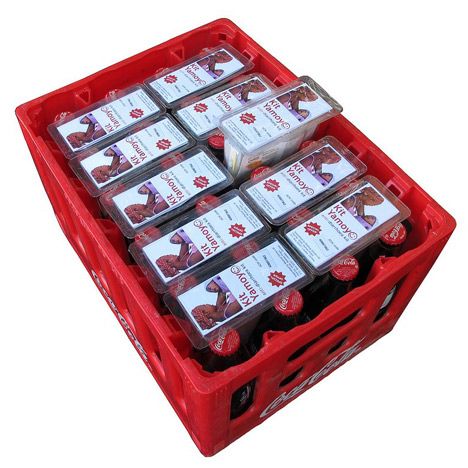
Coke-crate entrepreneur abandons award-winning design concept
News: the creator of an anti-diarrhoea pack for the developing world that was named product design of the year for the way it fits inside Coca-Cola crates has admitted that "hardly any" kits have been shipped this way, and has dropped the strategy in favour of more conventional packaging and distribution.

"Putting the kits in the crates has turned out not to be the key innovation," admitted social entrepreneur Simon Berry in a radio interview broadcast last weekend.
Berry, founder of the ColaLife charity and the brains behind the Kit Yamoyo medicine pack, conceded that despite winning the Design Museum's Product of the Year award last April for his idea, the strategy of piggybacking on Coca-Cola's distribution network to get the remedy to remote villages hadn't worked.
Instead, he said he is now focussing on creating a "value chain" to incentivise distributors and retailers across Africa. "That pack, sitting in that Coca-Cola crate, gets everyone very excited but it is quickly becoming a metaphor for what we're doing."
Berry travelled to the village of Kanchele in Zambia, where the product is being trialled, with BBC global business correspondent Peter Day as part of the programme broadcast on BBC Radio 4.
"I have to say Simon though, this is a bit of a con," Day said on discovering the innovative strategy had been dropped. "You got this award for the design product of the year, very ingenious, very clever, because it fitted into a crate of bottles. You've abandoned the crate of bottles distribution now, so it comes in very conventional, ordinary packs. You're nothing to do with cola now. In other words, the design is almost incidental."
Berry replied: "We are piggybacking on Coca-Cola in the sense that we're using their ideas, we're using all their wholesalers, who are very well respected and know how to look after stuff, but putting the kits in the crates has turned out not to be the key innovation."
Berry also conceded that the concept of delivering the kits in Coca-Cola crates hadn't worked in an interview with New Scientist magazine last month.
"In the end, hardly any of our kits have been put into [Coca-Cola] crates," he said. "Instead, what has worked is copying Coca-Cola's business techniques: create a desirable product, market it like mad, and put the product in a distribution system at a price so that everyone can make a profit. If there is demand and retailers can make a profit, then they will do anything to meet that demand."
Kit Yamoyo means "kit of life" in several African languages. The pack contains oral rehydration salts and zinc to treat diarrhoea, and a bar of soap. The plastic outer shell, which was originally designed to fit in the gaps between bottles in a Coca-Cola crate, doubles as a measure and cup for the medicine.
Diarrhoea kills more children in Africa than HIV, malaria and measles combined. Last April, Berry's kit was named winner of the product design category in the Design Museum's Designs of the Year awards.